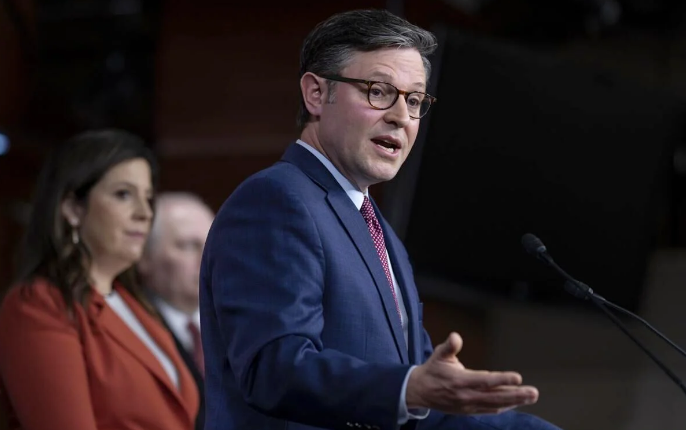As the year 2024 unfolds, the issue of border security has assumed a pivotal role in the agenda of the United States Congress, particularly capturing the attention of Republican lawmakers. This heightened focus is primarily driven by the surge in illegal border crossings and the intricate interplay between federal and state policies that impact border operations. House Speaker Mike Johnson (R-Louisiana) has emerged as a prominent voice on this matter, stressing its utmost significance in the lead-up to a congressional delegation’s visit to Eagle Pass, Texas.
Eagle Pass, situated along the Texas-Mexico border, has become a focal point for illegal border crossings, symbolizing the challenges faced in the region. It has evolved into a battleground for legal disputes between the federal government and Texas Governor Greg Abbott, particularly concerning the construction of border barriers. The upcoming visit by the congressional delegation aims to offer firsthand insights into the situation. This includes briefings by law enforcement and local officials, providing a comprehensive understanding of the concerns of residents directly affected by the complex dynamics of border security.

The delegation’s visit aligns with the ongoing debates in Congress regarding funding allocations. Notably, discussions are centered around foreign aid packages for Israel and Ukraine, intricately tied to funding for border operations. Critics argue that domestic challenges, such as the pressing issue of high inflation and the imperative of addressing border security, should take precedence over international aid.
The intricacies of the situation are further underscored by House Speaker Johnson’s recent letter to President Biden. In his communication, Johnson places blame on the administration for the border crisis, citing alarming statistics of record illegal entries, drug seizures, human trafficking, and an increased vulnerability to terrorist attacks. The House Speaker criticizes the administration’s policies, including the termination of the “Remain in Mexico” policy and the cessation of border wall construction. Johnson advocates for immediate executive actions to curb illegal immigration and regain operational control over the border.
These recent developments spotlight the multifaceted nature of border security, weaving together legal, political, and humanitarian dimensions. The findings of the Congressional delegation during their visit to Eagle Pass and their subsequent actions could wield substantial influence on the trajectory of U.S. border policy.
The urgency of the situation is emphasized by the unique challenges faced along the Texas-Mexico border, particularly in Eagle Pass. The region has witnessed a surge in illegal border crossings, necessitating a robust response from both federal and state authorities. The congressional delegation’s visit to this hotspot is strategically aimed at gaining a nuanced understanding of the ground realities.
Eagle Pass, with its distinct status as a hotspot for illegal border crossings, has become a microcosm of the broader challenges faced along the Texas-Mexico border. The legal disputes between the federal government and Texas Governor Greg Abbott regarding border barriers exemplify the complexities that underlie border security policies. The congressional delegation’s objective is not only to witness the situation firsthand but also to engage with law enforcement and local officials to comprehend the intricate web of challenges faced by residents directly impacted by the border dynamics.
As the congressional delegation undertakes this crucial visit, their timing coincides with ongoing debates in Congress over funding allocations. The discussions, revolving around foreign aid packages for nations such as Israel and Ukraine, are intimately tied to the funding required for effective border operations. Critics argue that, given pressing domestic challenges like high inflation and the escalating border security concerns, prioritizing international aid may not align with the immediate needs of the nation.
In the midst of these debates, House Speaker Mike Johnson has emerged as a leading voice, articulating the concerns of many Republicans. His recent letter to President Biden squarely places blame on the administration for the border crisis. Citing alarming statistics, including record illegal entries, drug seizures, human trafficking, and an increased vulnerability to terrorist attacks, Johnson critiques the administration’s policies. Key among his concerns is the termination of the “Remain in Mexico” policy and the halting of border wall construction. Johnson advocates for swift executive actions to curb illegal immigration and regain operational control over the border.
These recent developments underscore the multi-faceted nature of the border security issue, intertwining legal, political, and humanitarian dimensions. The findings and subsequent actions of the congressional delegation during their visit to Eagle Pass carry significant weight in shaping the future trajectory of U.S. border policy.
Read More:
- Texas City Grapples with Crude Oil Spill impacting the Environmental and Community
- A Comprehensive Guide to Rent Increases, Legalities, and Tenant Empowerment
- Oklahoma’s Response: Aftermath of Integris Health’s Data Breach
The focus on securing the Texas-Mexico border has become a paramount concern for the United States Congress in 2024, particularly among Republican lawmakers. The visit to Eagle Pass by a congressional delegation signifies a strategic effort to understand the complex challenges faced in the region. As debates over funding allocations unfold, the intersection of domestic and international priorities adds another layer of complexity to the issue. House Speaker Mike Johnson’s vocal stance, reflected in his letter to President Biden, further highlights the urgency and significance of addressing the border security crisis. The outcomes of this congressional focus and subsequent actions will likely have lasting implications for the nation’s approach to border policy.

